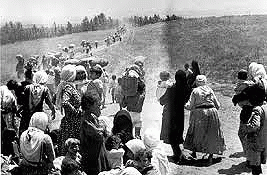 (Pictured: al-Nakba.)
(Pictured: al-Nakba.)
Foreign Policy in Focus’s own Peter Certo writes at DC Theatre Scene of a play premiering January 15 in Washington: “Theater J will host a two-week run of Return to Haifa, an adaptation by Israeli journalist and playwright Boaz Gaon of Ghassan Kanafani’s 1969 novella. . . . Presented by Israel’s premier Cameri Theatre of Tel Aviv and its talented cast of Arab- and Jewish-Israeli actors, the adaptation will likely be an American audience’s first introduction to the works of Kanafani.”
Ghassan Kanafani, incidentally, writes Certo, “was also a spokesman for the Popular Front for the Liberation of Palestine. His ties to perpetrators of the 1972 Lod Airport bombing, committed by Japanese Red Army members on behalf of the PFLP, may have led to his assassination that same year in Beirut – in all likelihood by the Mossad.”
In case you didn’t take all of that in, let’s review: a Palestinian play adapted by an Israeli, staged by an Israeli company, written by an author possibly killed by the Mossad. Talk about combustible mixtures. But that’s only the start. Certo explains:
The novella imagines a day-long encounter as a displaced Palestinian couple, Sai’d and Saffiyeh, return to their erstwhile Haifa home some 20 years after being forced to leave. There they meet Miriam, a Polish-born Holocaust survivor who moved into their house with her husband Ephraim.
Did I mention that it was explosive? Wait, there’s more.
The emotion intensifies as viewers discover that the Arab couple was forced not to leave only their home but their infant son Khaldun, who was adopted by Miriam and Ephraim and raised as their Jewish son Dubinka, or Dov. What follows are heart-rending arguments about who can claim the boy, now an IDF paratrooper – and perhaps the land of his birth. . . . In adapting Kanafani’s novella for the stage, Gaon explains, “We did not want an intellectual experience – but a heightened emotional one.”
Sounds like he got that all right. When it comes to the drama’s explosive yield, we’ve just seen it grow from a ton of TNT, barrel past a kiloton and go straight to a megaton. Ultimately, though, Return to Haifa is about initiating reconciliation. Certo writes:
Its Palestinian characters too, despite their own personal hardships, come to recognize and sympathize with the plight of Holocaust survivors like Miriam. Whatever their doubts about how to proceed, whatever their anguish or frustration, they inch toward an understanding of the people who call their former house home.
Reconciliation, of course, is impossible without empathy.
An effective work of drama, reflects director Sinai Peter, recognizes that “audiences really have the desire to feel empathy for a story. And it can overcome the fact that this empathy might have political consequences.”
Those who live in the DC area would be remiss in bypassing what sounds like a once-in-a-lifetime theatre experience.